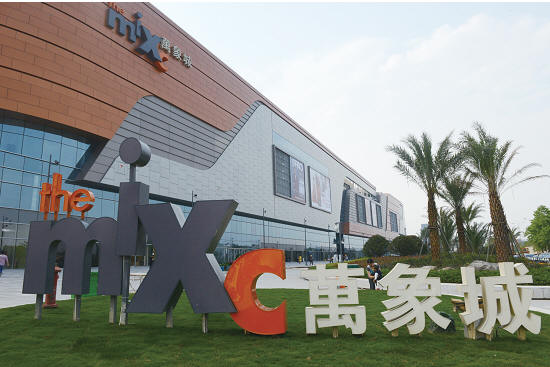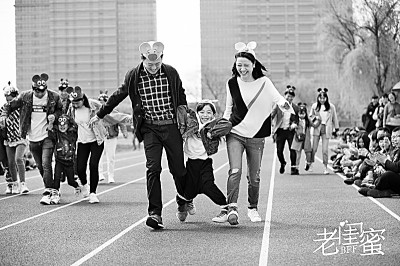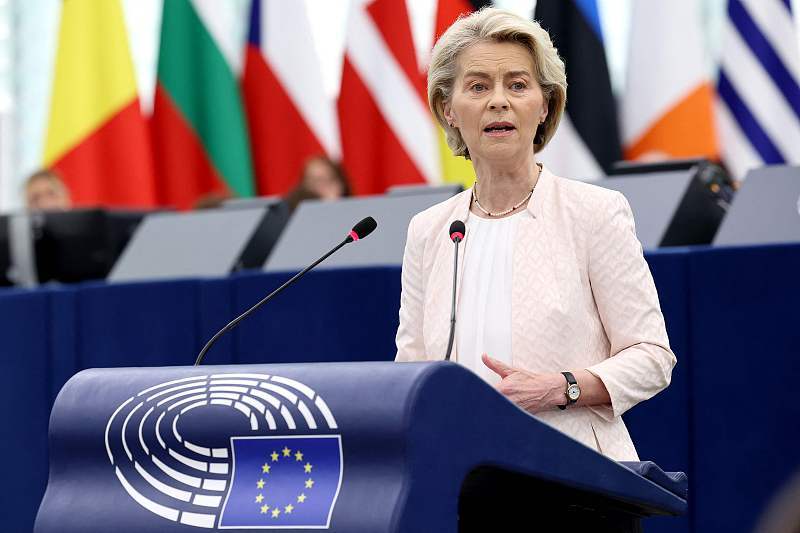On May 1st, Nantang Underground Mall opened, and the direct selling center for imported goods was unveiled at the end of May. In November, the citizens added a new place to go shopping.

Vientiane city is about to open. (photo by Xu Xiaochun)
The first Starbucks, the first Uniqlo and the first MUJI & HELIP; … When all brands that can represent fashion appear in Wenzhou people’s circle of friends, there will always be a rush to screen, and even the first Apple flagship store in Hangzhou and the first IKEA in Ningbo can trigger a large number of Wenzhou people to flock.
The reporter learned that Wenzhou Huarun Vientiane City has been confirmed to officially open on April 30th, and Nantang Underground Mall will also be unveiled on May 1st, and the imported goods direct sales center will be unveiled at the end of May, the first city outlet in central and southern Zhejiang — — Intime City Wenzhou Outlets has also confirmed that it will open its doors in November. These urban complexes and shopping malls that have been opened one after another will bring many "firsts" to Wenzhou people.
On April 30th, Wenzhou Vientiane City Shopping Center, which is located opposite to Sanyang Wetland on Wenrui Avenue, will open. As the first Vientiane City in southern Zhejiang, Wenzhou Vientiane City Shopping Center has 6 floors above ground and 2 floors underground, with a total area of 220,000 square meters and more than 300 brands. Many of these brands are entering Wenzhou for the first time, including Ole’ Boutique Supermarket, IKEA’s first PUP store in China, Lumiere IMAX Cinema and Shiyuetian Food Plaza are the four main stores in Vientiane City.
Joining Vientiane City in Wenzhou for the first time, there are MELAND Children’s Growth Paradise, the world’s largest retailer of toys and baby products, and more than 20 catering brands. The reporter learned that on April 30, including supermarkets, cinemas and food courts, 95% of the brands and shops in Vientiane City will open simultaneously. As the IKEA PUP store is still in the cloth field, it will open later.
"I originally planned to take a short trip during the May Day holiday, but now it is enough to go directly to Vientiane City." Miss Xu, a citizen, is a die-hard fan of Vientiane City. She used to go to Vientiane City in Hangzhou or Ningbo for a day on weekends. Since learning that Wenzhou is going to open Vientiane City, she has been paying attention to the latest progress. "The most convenient thing is that adults and children can find places to play."
The relevant person in charge of Wenzhou Vientiane City said that as a high-end commercial landmark building, in addition to experiential consumption such as catering, entertainment and parent-child space, Vientiane City also includes fast fashion brands in Europe, America, Japan and South Korea, as well as international famous products, and is positioned as a one-stop luxury shopping center with full format, which can bring real high-end fashion shopping experience to the public.
The reporter learned from China Merchants ouhai district that as an important project of Wen Shang’s return, Wenzhou China Resources Vientiane City was jointly developed by China Resources Land (Shanghai) Co., Ltd., a well-known domestic commercial real estate developer, and Senma Group, with a total investment of about 5 billion yuan. It is the leading shopping center and commercial complex in southern Zhejiang, and will effectively stimulate the popularity gathering and infrastructure construction in the surrounding areas after its opening.

Wenzhou Vientiane City Shopping Center has 6 floors above ground and 2 floors underground. (photo by Xu Xiaochun)
Seven highlights take you around Vientiane City.
1.Ole&rsquo under CR Vanguard; Boutique supermarket
Ole&rsquo, one of the four main stores in Wenzhou Vientiane City; More than 85% of the goods in the boutique supermarket are imported goods from more than 20 countries and regions, and more than 100 well-known brands are its partners. There are also a wine cellar center, a western-style gourmet area, a European bakery, an organic fruit and vegetable center, a maternal and child health center and a natural organic skin care center, as well as Ole’ Concept kitchen, etc.
2.The largest IMAX giant screen in Wenzhou
Lumiere IMAX Studio is one of the four main stores in Vientiane City, with 10 cinemas and 1,809 seats, including IMAX Hall equipped with a huge geometric embracing screen of 13× 24m. Its IMAX screen will be the largest of all cinemas in the urban area, surpassing the 12× 22m IMAX screen of Wanda Studios and the 10× 23m giant screen of Bailu Studios.
3.10,000 square meters of children’s world
It includes MELAND, a large-scale children’s play experience paradise, Toys "R" US Toys“R”Us, a high-end children’s clothing brand that creates a little fashionista, and Bon&Cheers Bar Cha Cha Happy Restaurant that can enjoy food and play at the same time.
4.EMAX virtual reality experience hall
Including roller coasters, night coasters, bungee jumping, F1 racing and other exciting games, as well as simulated adventure games such as real CS gun battles, Lost Abyss, Tower Defense Campaign and Jurassic Park, as well as thrilling and daring games such as ultimate horror and scary town, all of which can be experienced by VR glasses and the world’s first virtual reality "follow-up seat equipment".
5.Wen chan ping heng che shou Jia experience specialty store
The Andao Balance Car, which shines brilliantly at the Cultural Fair and attracts many fans, also settled in the iGe Chao Digital Store of Wenzhou China Resources Vientiane City. This is the first experience store in Wenzhou after it opened counters in the United States, New Zealand, Australia and other places, and opened six stores in South Korea. At the same time, DJI UAV, somatosensory game, home audio-visual and other products that electronic digital enthusiasts like have settled in iGe Tide Digital.
6.Many restaurants are 50% off all day.
Vientiane City not only has a food court with an area of nearly 2,000 square meters, but also brings together many catering brands, and all of them launch preferential activities on the opening day. For example, when Pacific Coffee is bought for one free in a limited time, grandma’s family actually pays a voucher for 200 yuan to send 100 yuan, and when dessert is bought for one free, there are also stores such as Xingzhou Coconut Farm, Xiaohuige Hot Pot, Dazui Hong Kong-style Tea Restaurant, Xingye and Yinzhu, which have a 50% discount on the opening day, and some catering brands have as low as 30% discount, so there are preferential activities during May Day.
7.The first IKEA PUP store in China (opened later)
The first IKEA PUP store in China is located in Vientiane City. The area is about 1800 square meters, and there are about 2500 kinds of goods on display, which can be used to order most of IKEA household products. You can also place an order through the network and deliver it from Ningbo shopping mall to Wenzhou ordering center before picking up the goods, or deliver it directly to your home. Also equipped with IKEA professional staff to provide home solution planning and purchasing services.
Outlets, the first city in central and southern Zhejiang, settled in Wenzhou.
Recently, many people passing through the Ouhai section of Shenhai Expressway have noticed a huge billboard — — "One-stop City Outlets Life Center" is the Yintai City Wenzhou Outlets, which is recently tearing down the wall and starting to show the whole picture. The reporter learned that Yintai City Wenzhou Outlets is scheduled to officially open in November this year, which will be the first city outlet in central and southern Zhejiang.
It is reported that Yintai City Wenzhou Outlets Project is the opening work for Yintai Commercial to enter the field of outlets for the first time, and has now entered the stage of interior decoration. It is reported that the store has a building area of 220,000 square meters, a business area of 140,000 square meters, three floors on the ground, a single floor area of more than 40,000 square meters, 3,500 parking spaces and a super-large ecological square of 80,000 square meters.
Different from the traditional outlets, Yintai City Wenzhou Outlets not only has famous products and popular discount clothes in the traditional sense, but also has rich living facilities such as IMAX Broadway cinema, Yonghui boutique supermarket, Magic Shell Children’s Recreation Center and large-scale sports professional supermarket.
"After the opening, it will become the first city outlet life center in Wenzhou and the first city outlet in central and southern Zhejiang." The relevant person in charge of Yintai City Wenzhou Outlets told the reporter that Yintai City was originally an experiential shopping center integrating catering, sports and entertainment, living facilities, cinemas and gyms. Now it will strengthen the unique format of "famous products+discounts" in clothing retail, and this positioning will be clearly different from other urban complexes.
Wenzhou retail industry analysts believe that the nearest outlet to Wenzhou is located in Huangyan, Taizhou, and its statistics show that a considerable number of tourists come from Wenzhou. The city Ole is the new favorite of retail business. As the largest shopping center in the west of Wenzhou, Yintai City Wenzhou Outlets can radiate not only ouhai district, downtown, but also Wenzhou counties and Lishui area, which will resolve the deadlock of increasing homogenization of Wenzhou shopping centers.
Nantang underground shopping mall opened on May 1st.

Nantang underground shopping mall will open on May Day. (photo by Jiang Wenguang)
On May 1st, a comprehensive underground mall covering an area of more than 4,000 square meters will be unveiled on the first floor of Buildings 2 and 3, Fengwei Street, Nantang, downtown.
"In their spare time, many citizens like to take a walk and stroll around Nantang Street, but apart from eating, drinking and having fun, they always feel that there is a lack of shopping places nearby." After learning that Nantang Underground Mall will be opened, Mr. Wang rented two stores to run children’s wear stores for the first time. Like Mr. Wang, there are still many merchants who turn their attention to the underground shopping mall of Nantang Street. In the past two days, the underground mall shops have entered the final decoration and layout stage.
On the morning of April 27th, the reporter saw the shops in the underground mall lined up in turn along the east and west passages, bringing together more than 60 brands in Wenzhou and at home and abroad, including 11 categories of imported goods, daily necessities, leisure goods, home life, brand-name shoes and clothing, music equipment, luggage and leather goods, and about 30,000 items.
"At present, 71 merchants have settled in the underground mall, and the business hours are from 10 am to 10 pm. I hope that the appearance of the mall will further enhance the format of Nantang Style Street." The person in charge of the operation and management of Nantang Fengwei Street is introduced.
The person in charge of the company said that the planning function of Nantang Fengwei Street was initially positioned as a comprehensive tourism and cultural business district integrating catering, leisure, entertainment, culture, tourism and shopping, and it was called "Wenzhou City Living Room". However, at present, there are many restaurants in Nantang block, and this business format is not very satisfactory. In April 2018, the first lease of Nantang Street will expire. At that time, each building will be divided into multiple tenders to avoid subletting, so as to gradually adjust some formats in the block and retain enterprises with high visibility and good brands.
The direct selling center for imported goods was unveiled at the end of May.
It covers an area of 20,000 square meters and has three floors. It will be unveiled at the end of May. This will be the largest direct selling center for imported goods in our city, where citizens can buy all kinds of imported goods from Europe, America, Japan, South Korea, Australia and other places.






















